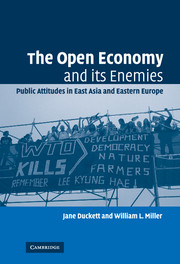Book contents
- Frontmatter
- Contents
- List of tables
- Acknowledgements
- List of acronyms
- 1 Understanding public attitudes towards the open economy
- 2 Change and discontent
- 3 Public support for economic openness
- 4 Public support for cultural protection
- 5 Protest and resistance
- 6 The role of the state
- 7 The legacy of regime change
- 8 The extent, nature, causes and consequences of public discontent
- References
- Index
8 - The extent, nature, causes and consequences of public discontent
Published online by Cambridge University Press: 22 September 2009
- Frontmatter
- Contents
- List of tables
- Acknowledgements
- List of acronyms
- 1 Understanding public attitudes towards the open economy
- 2 Change and discontent
- 3 Public support for economic openness
- 4 Public support for cultural protection
- 5 Protest and resistance
- 6 The role of the state
- 7 The legacy of regime change
- 8 The extent, nature, causes and consequences of public discontent
- References
- Index
Summary
At the start, we posed four broad questions about globalisation and its discontents, in particular about public discontent in the developing or transitional countries of East Asia and East Europe:
How much discontent?
What was the nature of that discontent?
What were the causes of discontent?
What were the consequences of discontent?
We now return to those questions, and review the evidence.
The extent of discontent
Like United Nations Development Programme (UNDP) analysts, the public in our four countries felt that recent changes had produced sharply increasing, and unjustifiable, inequalities. They felt the beneficiaries of recent changes had been rich countries, foreigners, and local officials or businessmen, rather than ordinary local people. Except in Vietnam, they felt the local beneficiaries had been those with more power and contacts rather than those with more skill, education or even luck. They felt crime, corruption, pollution and environmental damage were increasing; and while they might claim their national culture was increasingly respected abroad they nonetheless felt their traditional way of life was threatened. Except, once again, in Vietnam, they thought the economy had declined though they expect improved living standards in the future.
The public generally blamed adverse trends on local, internal influences rather than on foreign influences, and the extent of public discontent with globalisation was limited. With respect to attitudes towards the market economy or economic openness, the public were ‘critical supporters’, even ‘highly critical supporters’, but supporters nonetheless.
- Type
- Chapter
- Information
- The Open Economy and its EnemiesPublic Attitudes in East Asia and Eastern Europe, pp. 247 - 258Publisher: Cambridge University PressPrint publication year: 2006



